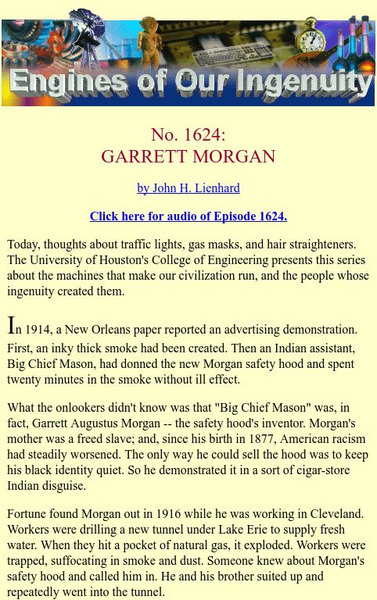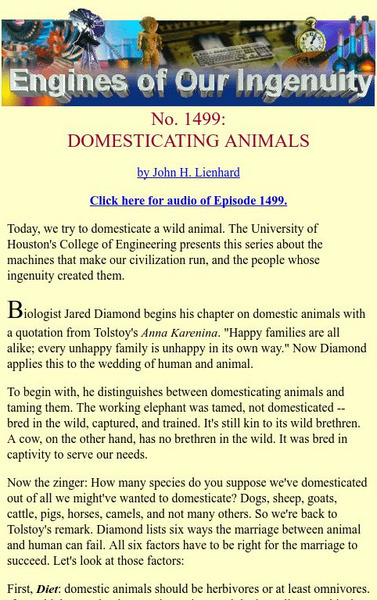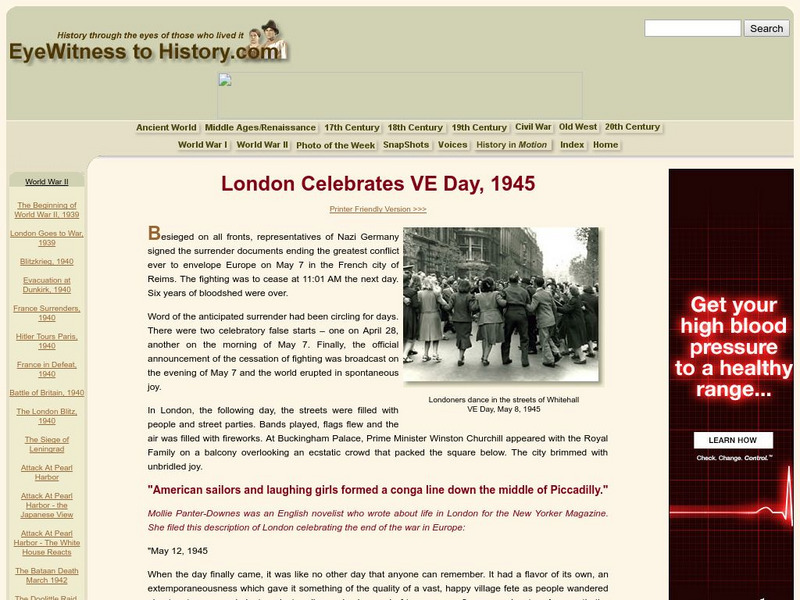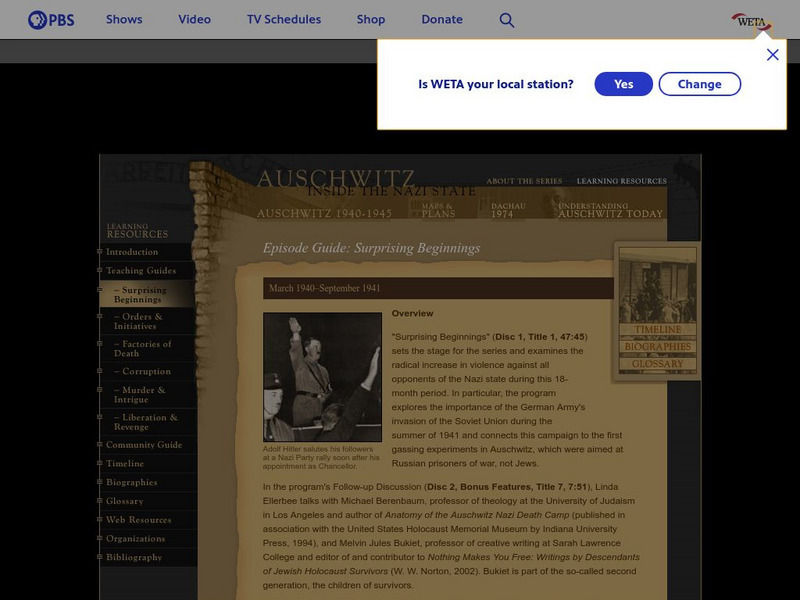Hi, what do you want to do?
University of Houston
University of Houston: Engines of Our Ingenuity: No. 954: Moses Austin's Lead
An account of the beginning of the American lead industry started by Moses Austin, a Texas pioneer. This is a transcript of an accompanying radio broadcast.
University of Houston
University of Houston: Engines of Our Ingenuity: No. 1624: Garrett Morgan
Article focusing on Garrett Morgan, inventor of the traffic signal, gas mask, and an innovative hair straightener. This is a transcript of an accompanying radio broadcast.
University of Houston
University of Houston: Engines of Our Ingenuity: No. 522: Jan Matzeliger
A brief biography of Jan Matzeliger, an African-American inventor who revolutionized the shoe manufacturing industry. Read about his early troubles and how he graciously lived his life. This is a transcript of an accompanying radio...
University of Houston
University of Houston: Engines of Our Ingenuity: No. 158: Lewis Latimer
A brief biography of African-American inventor, Lewis Latimer. Read about his association with both Hiram Maxim and Thomas Edison in developing the incandescent light bulb. This is a transcript of an accompanying radio broadcast.
University of Houston
University of Houston: Engines of Our Ingenuity: No. 326: Colonial Women Inventors
Provides information on two Colonial women inventors. This is a transcript of an accompanying radio broadcast.
University of Houston
University of Houston: Engines of Our Ingenuity: No. 1499: Domesticating Animals
This article names six factors that must exist in order for a species to be domesticated by humans. Includes analysis of diet, growth rate, breeding, personality, disposition, and social structure. This is a transcript of an accompanying...
University of Houston
University of Houston: Engines of Our Ingenuity: No. 695: John Ericsson
A biography of John Ericsson, a man who invented in three countries over most of a century. He invented an early locomotive, a hot-air engine, screw propeller, and the Monitor, which was used in the Civil War. This is a transcript of an...
PBS
Art:21: Migrating Viewpoints
Use this lesson to take a closer look at what the visual arts can tell us about the emotional effects of migration, both voluntary and involuntary. Lesson includes sample video excerpts from the broadcast, slideshows of the work of...
TED Talks
Ted: Ted Ed: Leslie Dodson: Don't Misrepresent Africa
Broadcast journalist, Leslie Dodson, presents research that focuses on the intersection of micro-enterprise and digital technologies in developing communities in Africa. Dodson discusses how hard it is to be a journalist and the special...
Ibis Communications
Eyewitness to History: London Celebrates Ve Day, 1945
Read the description of the celebrations in London on V-E Day in May, 1945. In addition, listen to the radio broadcast of the surrender of Germay.
Ibis Communications
Eyewitness to History: Crash of the Hindenburg
The resource explores the crash of the Hindenburg in 1937. Listen to radio reporter Herbert Morrison's riveting broadcast as he discusses the explosion of the giant airship.
PBS
Pbs Teachers: Auschwitz: Surprising Beginnings (Episode Guide)
Go directly to the teaching resource developed to accompany the first episode in the six-part documentary on Auschwitz ("Auschwitz: Inside the Nazi State") broadcast by PBS. Find a discussion guide for clarifying how and when the Nazis...
PBS
Pbs Teachers: Auschwitz: Orders and Initiatives (Episode Guide)
Go directly to the teaching resource developed to accompany the second episode in the six-part documentary on Auschwitz ("Auschwitz: Inside the Nazi State) broadcast by PBS. Find a discussion guide for clarifying the spread of Nazi...
PBS
Pbs: Sandro Botticelli
An essay on the life and work of Sandro Botticelli, famed artist of the Italian Renaissance, with wonderful reproductions of two of his acclaimed works, "La Primavera" and "Birth of Venus." Part of a larger site on the Renaissance...
Other
Real Audio en Espanol
A link to all the hispanic countries with their radio and TV stations available through RealAudio. With luck you may find a weather broadcast live on a station you're listening to. Interesting either way!
PBS
Pbs Online News Hour: Evening News Tom Brokaw
This site has an interview of Tom Brokaw that investigates the importance and impact of the Evening News shows put on by the big broadcast networks.
National High Magnetic Field Laboratory
Magnet Academy: Timeline of Electricity and Magnetism: 1880 1889
Nikola Tesla and Thomas Edison duke it out over the best way to transmit electricity and Heinrich Hertz is the first person (unbeknownst to him) to broadcast and receive radio waves.
PBS
Pbs: A Capital Fourth
This is a companion site to a PBS broadcast of a 4th of July concert held in Washington, DC. Features quizzes, history of the holiday, patriotic reflections, and information on the concert itself.
NPR: National Public Radio
Npr: Rubber Ducks Make Cross Oceanic Voyage
This radio broadcast describes the tracking of rubber ducks that were accidentally dumped into the north Pacific Ocean in 1992. Scientists are learning a lot about ocean currents as the ducks arrive on land in various countries.
Math Playground
Math Playground: Problem Solving Videos
"Rated 'M' for middle school," Math TV invites you to tune in each week for videos of word problems being solved. Back episodes are available in subjects such as percentages, number sense, and fractions. Watch a problem worked out, then...
NPR: National Public Radio
Npr: Mamie Smith and the Birth of the Blues Market
This overview of a story originally aired on All Things Considered on NPR provides a description of the story complete with pictures and pertinent media. The entire radio broadcast is also provided in full.
Wessels Living History Farm
Living History Farm: Television During the 1950s and 60s
Read a history of television in the 1950s and 1960s to see how it became such a cultural icon. Find out about the many genres of television that were broadcast during that time.
National Pest Managment Association
Pest World for Kids: Report Writing
Do you need to write a paper for your Science class? Want to create a public service announcement to broadcast during your school's morning announcements? Or, do you need to make a digital slideshow for a small group project? If so,...
University of Houston
University of Houston: Engines of Our Ingenuity: No. 1252: Interchangeable Parts
A fun-to-read article on the history of interchangeable parts. Find out that Eli Whitney was not the first to have this manufacturing idea, but he capitalized on it. This is a transcript of an accompanying radio broadcast.
Other popular searches
- Public Broadcasting Service
- Broadcasting
- News Broadcast
- Television Broadcasting
- Broadcasts
- Broadcast Advances
- Broadcasting Activities
- Broadcasting Codes
- Radio Broadcasts
- News Broadcast Rubric
- Radio Broadcasting
- History News Broadcast


























